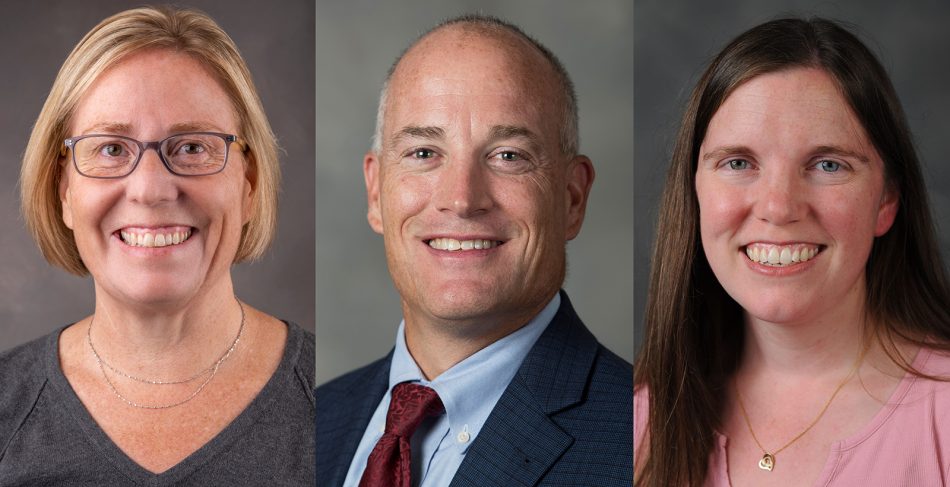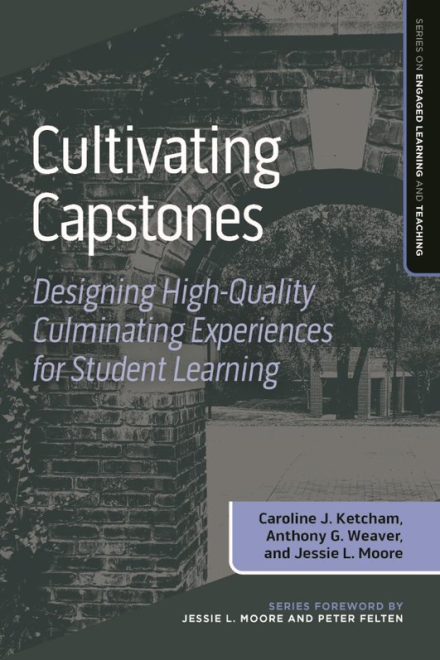Edited by Elon University faculty members Caroline J. Ketcham, Anthony G. Weaver and Jessie L. Moore, “Cultivating Capstones: Designing High-Quality Culminating Experiences for Student Learning” delves into capstone experiences, identifying characteristics that contribute to worthwhile learning opportunities and how institutions might best serve students.

When reflecting on her new co-edited book, “Cultivating Capstones: Designing High-Quality Culminating Experiences for Student Learning,” Professor Caroline J. Ketcham explained that there is a “richness” that develops through well-orchestrated multi-institutional and international collaborations, positively impacting her work and how she conducts it.
“Cultivating Capstones,” published this spring by Stylus Publishing in collaboration with Elon’s Center for Engaged Learning, expounds on such a process, where approximately 25 scholars and practitioners from across the globe explored the landscape of capstone experiences in higher education.
 The book’s roots trace back to the center’s three-year research seminar on capstone experiences that began in 2018. Ketcham partnered with co-editors Associate Dean Anthony G. Weaver and Professor Jessie L. Moore, who directs the center, to organize and publicize the seminar’s findings, strategies and best practices. The publication is divided into three parts, identifying essential capstone characteristics, sharing examples from multiple institutions, and highlighting research-informed strategies for professional development.
The book’s roots trace back to the center’s three-year research seminar on capstone experiences that began in 2018. Ketcham partnered with co-editors Associate Dean Anthony G. Weaver and Professor Jessie L. Moore, who directs the center, to organize and publicize the seminar’s findings, strategies and best practices. The publication is divided into three parts, identifying essential capstone characteristics, sharing examples from multiple institutions, and highlighting research-informed strategies for professional development.
“The book, I hope, is a forward-facing view of what capstones are and what they could become,” said Weaver, who co-led the three-year research seminar with Ketcham.
The overarching directive of the seminar cohort was to study the capstone experience through different perspectives, looking at how internal and external constituents view capstones. According to Weaver, this process meant exploring how one teaches a capstone, the challenges that exist in designing a capstone, how institutions message capstones, and how these experiences fit into a departmental or university curriculum, among other related topics.
The student’s perspective was of great importance in their conversations, Weaver explained.
“Capstones need to be nimble enough to teach material that should really be for the student and about the student,” he said. “We want to give them a good experience to work on signature projects that build off of what they have learned. And perhaps, more importantly, try to prepare them for what is next, whether that is a career or graduate school. We want them to know what they can do with the skills they’ve obtained and how can they enhance their next phase.”
Moore said the book’s publication provides an opportunity to “synthesize” what the center learned from research seminar participants, and to share it with a broader audience. By publishing the seminar’s conclusions, the group’s findings can be part of other conversations around capstone-related research.
“We knew that we had some really important studies from our seminar participants that need to be shared with the world because we weren’t the only ones working on this important topic,” she said. “The book gave us a chance to put all of that research in conversation in ways that also highlight implications for practice – and that is always an important goal for the center. It’s not just about the research, it’s about what does it mean for practice for higher education campuses across the globe.”
During their collective research and the seminar, it became apparent to the co-editors that while many institutions talk about incorporating capstones, they are not necessarily aligning their messaging about capstones.
“As a result, students and alumni have a different understanding of them than the faculty and staff,” Moore said. “If you can put those perspectives into alignment, and more clearly clarify for students what the purpose of capstones are, then they can have a greater impact on student learning.”
And, despite the best of intentions, this language barrier can often be self-inflicted.
“Sometimes, in our effort to make a course more interesting, we give it a snazzy name that speaks to the content focus but not to the learning goals,” Moore said. “And that sometimes makes it harder for the student to see that this ‘cool class’ is also capping their college experience.”
Weaver said that the capstone experience can actually be hurt by “academic lingo.”
“We assume when we use the word ‘capstone’ that everyone knows what we are talking about. In my own experiences, that isn’t true. Capstones – and their value – need to be explained, discussed and taught.”
– Anthony G. Weaver
Weaver said that what he appreciates most about “Cultivating Capstones” is the book’s depth, explaining that it isn’t a recap of what is already known about capstone experiences. He notes that the publication also explores early college and community college examples, which don’t always receive the recognition they deserve.
“There is a lot of research on what the capstone is and the role that it plays in higher ed,” Weaver said. “I think we went beyond that and tried to address how to make things better. We acknowledge that each institution faces unique challenges, so the book does not dictate a specific path to successful capstones. It is designed for each individual institution to evaluate their capstone and how it fits their department and their students. We offered useful suggestions on how the experience might be improved.”
Time and again, Weaver said the researchers kept students at the “forefront of the conversation.”
“How do we support the numerous constituents involved in a successful capstone, so the end result leads to improved student success?” Weaver asked. “That to me was important throughout the whole seminar, and that is important as people are reading the book.”
Ketcham reasoned that capstones and signature experiences are critical components of a student’s educational journey, largely because students have significant input into the experience.
“It is a place in our curriculum where students have agency in their education – tying together their holistic experience and helping them think about and apply it to what is next for them,” she said. “This comes in many forms, but hopefully students see the value in all they have engaged in as part of their college experience.”
Citing several national surveys, Moore noted that employers value – and seek out – individuals who can integrate knowledge from multiple places and make sense of it. Ultimately, that is the capstone experience.
“Capstones give students a space to practice that integration, to think about what they’ve learned across courses in their major, and connect and inform their professional identify in their discipline,” she said. “It allows students an opportunity to make sense of how that all fits together. They are developing a skill and capacity that employers are looking for.”
Moore cited an additional benefit of students embracing capstone experiences – an appreciation for the entire academic journey. According to Moore, the center’s research has found that students and graduates who have had the opportunity to make sense of how the pieces fit together are more likely to consider college and its investment worth it.
“Students don’t always understand that they can transform knowledge from one class to another class,” she said. “The more we can explicitly invite them to do that, and open up spaces for that transfer of knowledge and allow that integration of learning to occur, the more success they have as they develop as professionals.”
The book’s initial reception has been positive, according to Moore. Early readers have stated the publication has helped them reimagine what is possible on their campuses. The book is also a resource they can share to strengthen their programs and to look at how they are talking about capstones with students, with other faculty, with administrators, and with potential employers.
“So far, the book is meeting its goal of helping folks think about how research can inform practices on their campuses,” Moore said.
Weaver commended the center, its research, and Moore for the value they collectively bring to important conversations at Elon and campuses across the globe.
“What I love about the center is that it is producing collaborative research that practitioners can apply immediately,” Weaver said. “The center fits perfectly with the mission of Elon. Every summer, through their research seminars, the center has a new group bringing in new perspectives studying a topic related to engaged learning.”
The university outlines its commitment to student learning and mentoring in the Boldly Elon strategic plan. And the center’s mission clearly fits into the plan’s first theme, Learn, Moore explained.
“At the center, we are constantly thinking about how to foster research on the things that Elon already values, so we can do them more effectively for student learning on campus and elsewhere,” Moore said. “When you look at the Boldly Elon plan, there is a line in it about setting the standard for engaged learning and mentoring – and we are doing that. We are the international research center for engaged learning. As far as we can tell, there isn’t another center like us. We are able to have a direct impact on the practice of learning at higher education universities and colleges.”
About the Center for Engaged Learning
The Center for Engaged Learning brings together international leaders in higher education to develop and to synthesize rigorous research on central questions about student learning.
Researchers have identified “high-impact” educational practices – active learning, study abroad, undergraduate research, internships, service-learning, writing-intensive courses, living-learning communities, and so on. However, while we know what effective practices are, we could know much more about three essential issues: (1) how to do these practices well and in diverse contexts, (2) how to scale these practices equitably to all students, and (3) how students integrate their learning across multiple high impact experiences.
The Center for Engaged Learning: fosters investigations of these and related questions; hosts multi-institutional research and practice-based initiatives, conferences, and seminars; and shares related resources for faculty and faculty developers on high-impact practices for engaged learning.
The Center for Engaged Learning was launched in 2012 as part of Elon University’s strategic plan, The Elon Commitment.


